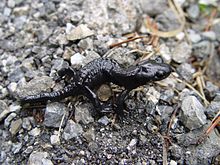| Salamandra Temporal range: [1] | |
|---|---|
 | |
| Salamandra atra | |
| Scientific classification | |
| Domain: | Eukaryota |
| Kingdom: | Animalia |
| Phylum: | Chordata |
| Class: | Amphibia |
| Order: | Urodela |
| Family: | Salamandridae |
| Subfamily: | Salamandrinae |
| Genus: | Salamandra Laurenti, 1768 |
| Species | |
See text | |
Salamandra is a genus of six species of salamanders localized in central and southern Europe, Northern Africa, and western Asia.





